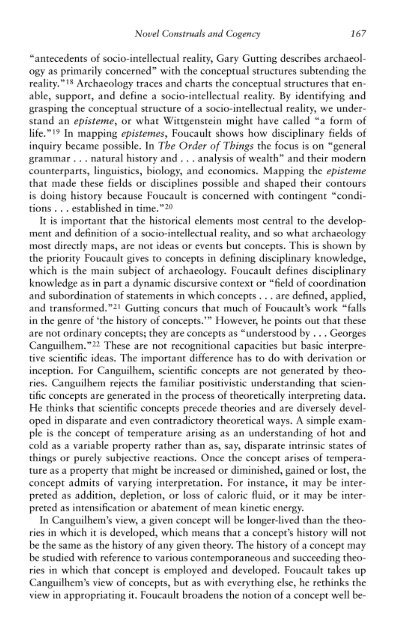Starting with Foucault: An Introduction to Genealogy, Second Edition
Starting with Foucault: An Introduction to Genealogy, Second Edition
Starting with Foucault: An Introduction to Genealogy, Second Edition
You also want an ePaper? Increase the reach of your titles
YUMPU automatically turns print PDFs into web optimized ePapers that Google loves.
NoveE (7unstrgab and Gc~ge~cy 167""antecedents of socio-intellectual realit5 Cary Gutting describes archaeologyas primarily concerned'kith the conceptual structures subtending thereality."'lg Archaeology traces and charts the conceptual structures that enable,support, and define a sacio-intelleaual reality. By identifying andgrasping the conceptual structure of a socio-intellectual reality, we understandan epktsme, or what Wittgenstein might have called "a form oflife."I"sn mapping egis;temes, Foucau lt shows how disciplinary fields ofinquiry became possible. In "Phe Order o(Thiags the focus is on ""geaeralgrammar . . . natural his<strong>to</strong>ry and . . . analysis of wealth" and their moderncounterparts, linguistics, biology, and economies. Mapping the epkternethat made these fields or disciplines possible and shaped their con<strong>to</strong>ursis doing his<strong>to</strong>ry because <strong>Foucault</strong> is concerned <strong>with</strong> contingent "conditions. . . established in time*79zoIt is important that the his<strong>to</strong>rical elements most central <strong>to</strong> the developmentand definition of a socio-intellectual reality, and so what archaeologymost directly maps, are not ideas or events but concepts, This is shown bythe priority Foucadt gives tc, concepts in defining disciplinary knowledge,which is the main subject of archaeojogy, <strong>Foucault</strong> defines disciplinaryknowledge as in part a dynamic discursive context or ""fld of coordinationand subordination of statements in which concepts . . . are defined, applied,and transEormed."a Gutting concurs that much of <strong>Foucault</strong>k work 'ValJ1sin the genre of %he his<strong>to</strong>ry of concepts.""" However, he points out that theseare not ordinary concepts; they are concepts as '"unders<strong>to</strong>od by ... GorgesCanguilhem,'QTThese are not recognitional capacities but basic interpretivescientific ideas. The important dllierence has <strong>to</strong> do <strong>with</strong> derivation orinception. For Canguilhem, scientific concepts are not generated by thesries,Canguilhem rejects the familiar positivistic understanding that scientificconceps are generated in the process of theoretically interpreting data.He thinks that scientific concepts precede theories and are diversely developedin disparate and even contradic<strong>to</strong>ry theoretical ways, A simple exampleis the concept of temperature arising as an understanding of hot andcold as a variable property rather than as, say, disparate intrinsic states ofthings or purely subjective reactions. Once the concept arises of temperatureas a properry that might be increased or diminished, gained or lost, theconcept admits of varying interpretation. For instance, it may be interpretedas addition, depletion, or loss of caloric fluid, or it may be interpretedas intensification or abatement of mean kinetic energy.In Canguilbem3 view, a given concept will be longer-lived than the theariesin which it is developed, which means that a concept's his<strong>to</strong>ry will notbe the same as tile his<strong>to</strong>ry of any given theory. The his<strong>to</strong>ry of a concept maybe studied vvitb relerence <strong>to</strong> various contemporaneous and succeeding theoriesin which that concept is employed and developed. bucault takes upCangullhem's view of conceprs, but as <strong>with</strong> evewhing else, he rechinks theview in appropriating it, Poucaulr broadens the nation of a concept well be-


